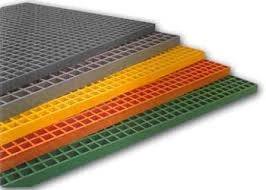loading...
- No. 9, Xingyuan South Street, Dongwaihuan Road, Zaoqiang County, Hengshui, Hebei, China
- admin@zjcomposites.com
- +86 15097380338
- Welcome to visit our website!
frp pressure vessel tank
FRP Pressure Vessel Tanks A Comprehensive Overview
Fiber Reinforced Plastic (FRP) pressure vessel tanks are an innovative solution in the storage and transportation of liquids and gases under pressure. These tanks have gained traction across various industries due to their lightweight, corrosion-resistant properties, and superior strength when compared to traditional materials like steel or fiberglass. This article delves into the characteristics, applications, benefits, and considerations associated with FRP pressure vessel tanks.
Characteristics of FRP Pressure Vessel Tanks
FRP pressure vessels are constructed using a combination of polymer resin and glass fiber reinforcement. This composition allows for strong, durable tanks that can withstand high pressures while remaining relatively lightweight. The manufacturing process typically involves techniques like filament winding, which ensures uniform thickness and enhanced structural integrity.
One of the most notable characteristics of FRP tanks is their resistance to various corrosive substances. Unlike metal tanks that may experience rust or degradation, FRP tanks offer long-term performance in hostile environments. This makes them ideal for applications involving chemicals, seawater, and other corrosive materials.
Applications of FRP Pressure Vessel Tanks
FRP pressure vessel tanks are widely utilized across multiple sectors, including
1. Chemical Industry In chemical processing plants, FRP tanks are used to store aggressive chemicals and solvents. Their ability to resist corrosion enhances safety and longevity.
2. Water Treatment These tanks play a critical role in water treatment facilities, where they are used for the storage of treated water and various chemicals used in the purification process.
3. Oil and Gas In the oil and gas industry, FRP tanks serve as a safe alternative for storing hydrocarbons and other volatile substances, helping to reduce the risk of environmental contamination.
4. Food and Beverage The food industry relies on FRP tanks to store ingredients and processed products, as they maintain the integrity of the contents without leaching harmful substances.
5. Waste Management These tanks are effective in the storage and treatment of wastewater and other hazardous materials, contributing to more sustainable waste management practices.
Benefits of FRP Pressure Vessel Tanks
frp pressure vessel tank

The advantages of FRP pressure vessel tanks are manifold
- Lightweight Compared to metal counterparts, FRP tanks are significantly lighter, resulting in reduced transportation costs and easier installation.
- Corrosion Resistance As mentioned, the resistance to corrosion extends the service life of the tanks, minimizing maintenance and replacement costs.
- Thermal Insulation FRP offers excellent thermal insulation properties, making these tanks suitable for processes that require temperature control.
- Customizability Manufacturers can easily tailor FRP tanks to meet specific dimensional and performance requirements, offering solutions for a variety of applications.
- Environmental Impact The durability and longevity of FRP tanks contribute to reduced resource usage and waste generation over time, aligning with sustainable practices.
Considerations for FRP Pressure Vessel Tanks
While FRP pressure vessel tanks offer numerous benefits, users should also be aware of certain considerations
- Initial Cost The upfront cost of FRP tanks can be higher than traditional materials. However, the long-term savings in maintenance and replacement often justify this investment.
- Temperature Limitations While FRP performs well in many temperatures, extreme conditions may necessitate special formulations or reinforcement.
- Regulatory Compliance Users must ensure that the selected FRP tanks meet local regulations and standards for pressure vessels, particularly when utilized in regulated industries.
In conclusion, FRP pressure vessel tanks represent a significant advancement in materials technology, offering a robust and versatile solution for various storage and transportation needs. Their unique characteristics and advantages make them an attractive choice for industries ranging from chemicals to food processing. As technology and manufacturing processes continue to evolve, we can expect further developments that will enhance the performance and applicability of FRP pressure vessel tanks, reinforcing their role in modern industrial applications.
-
The Rise of FRP Profiles: Strong, Lightweight, and Built to LastNewsJul.14,2025
-
SMC Panel Tanks: A Modern Water Storage Solution for All EnvironmentsNewsJul.14,2025
-
GRP Grating: A Modern Solution for Safe and Durable Access SystemsNewsJul.14,2025
-
Galvanized Steel Water Tanks: Durable, Reliable, and Ready for UseNewsJul.14,2025
-
FRP Mini Mesh Grating: The Safer, Smarter Flooring SolutionNewsJul.14,2025
-
Exploring FRP Vessels: Durable Solutions for Modern Fluid HandlingNewsJul.14,2025
-
GRP Structures: The Future of Lightweight, High-Performance EngineeringNewsJun.20,2025
